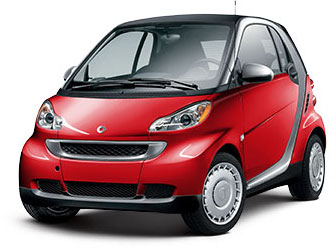You've probably seen, or if you don't live too close to a major urban area, have at least heard of a relatively new vehicle known as the Smart Car. The Smart Car, designed to be a highly fuel-efficient and easy to maneuver and park utility vehicle, (obviously important in many U.S. cities), debuted in America a few years ago, and reaching its sales peak in 2008, just as domestic gas prices were soaring.
The Smart Car is not just 'smart', but its also quite small. Almost incredibly, jarringly, and even disorienting small. To put the Smart Car in perspective, the length of a 2011 Honda Accord is about 195 inches , for the Smart Car you are looking at about 106 inches. Or for another frame of reference, Kareem Abdul-Jabbar stands at about 86 inches.
But from its peak in 2008, Smart Cars have in the last few years seen a gradual, yet steady decline in awareness, interest, and sales. The most recent annual estimate was about 6,000 Smart Cars were sold in 2010.
The parent company of Smart, Daimler, has recently announced that Smart Cars will be the beneficiary of a new national advertising campaign, and has also indicated the dealer network in the U.S. will expand from 75 to 100. While this is good news for fans and employees of Smart, only time will tell if these measures can turn around the flailing brand.
Even for a truck driving, HR Mini scoffing, traditionalist like me the Smart Car seems like it would be kind of fun to drive. So why are sales in a free fall?
And why should you care about the (short) rise, fall, and uncertain future of the Smart Car?
Well to me, the story offers a few interesting angles, the foremost one a lesson about how an idea, even an idea that seems like it should succeed, often needs much more than its own cleverness to make any kind of a lasting impact. My most measures, the Smart Car really should be a success. It is extremely economical in purchase and in operating cost, its diminutive dimensions make it a perfect vehicle for urban settings, and its quirky uniqueness caters well to the 'look at me and what I'm driving' constituency among us. The Smart Car website contains scores of pictures of happy Smart owners, (many with highly personalized modifications of the base vehicle that emphasize its flexibility and fun.
But even with all these attributes going for it, the Smart Car is in trouble. And the main reason is that the brand managers have allowed pre-perceptions, often inaccurate ones particularly about the vehicle's crash-worthiness, dominate potential customers and the public's views of the car. People look at the tiny car and often reflexively conclude there's no way I'd be safe in a car so small.
And that is kind of too bad, because despite what really is a cool idea - economical, agile, quirky urban transportation, the Smart Car might soon become a footnote, albeit a small one, in automotive history.
The Smart Car was, and I suppose still is, a really good idea. Too bad for Smart, the company has not quite realized a good idea in only step one on the long march to success.